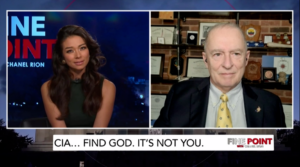UKRAINIAN QUICKSAND: THE LAW OF UNINTENDED CONSEQUENCES
by Jeemes Akers
“The law of unintended consequences is the only real law of history.”
Niall Ferguson
“There are downsides to everything; there are unintended consequences to everything.”
Steve Jobs
Last week, I met my close friend (and fellow Agency “cube mate”) Nat W. at the historic Vienna Inn for lunch. After exchanging pleasantries about our respective families, we dove, head-first, (like a couple Mexican retired cliff divers) into the Ukrainian situation. Nat—we called him “the Hammer” at work because of his dogged persistence in clinging to his analytical line of reasoning—started pounding away at Putin and his logic for invading the Ukraine. Two hours and a BLT later, we left but not until after discussing most of the world’s pressing problems. We made a bet (a lunch sandwich at the Vienna Inn payable by the loser in two years) over my prediction that Germany again will be receiving Russian oil shipments within two years; I also predicted that in two decades we may regret the decision to press the Germans to rearm. Nat asked me why I thought that and I answered that historically Germany (and Prussia) were subject to a militaristic spirit. The notion that countries could be moved by activity in the spiritual realm rather than the worldly product of human, economic or sociological decisions was foreign to Nat—as it is, quite honestly to most people I converse with these days. At any rate, my main take-away from our discussion was the notion of future unintended consequences that would flow out of the Ukrainian debacle; hence this missive.
For Nat, he wanted me to read a recent opinion piece in The Washington Post by David Von Drehle on the influence of extremist Russian thinker Alexander Dugin on Putin’s strategic thinking.[1] I agreed to do so.
In my view, Dugin’s popularity as a Russian political strategist—and futurist—is one of many historical unintended consequences growing out of the ignominious collapse of the Soviet Union. Far more applicable to this missive, Dugin’s ideas (and those like him), as well as their influence on Putin, grew deep ideological tentacles that have penetrated into the broader Ukraine invasion story. Simply put, without the fall of the former Soviet Union, and subsequent notions to recreate it, there would be no Dugin, or his bizarre ideas (at least from our western perspective). The incubator for these ideas was the collapse itself, a time—in Andrew Sullivan’s words—where a Russia “gasping for coherence, [was] in the midst of national humiliation.”[2] Or, in John McCain’s words, Russia was reduced to a “gas station masquerading as a country,” wedged between Europe and China.[3] The Russians, themselves (talking about the failure of Yeltsin-era reforms) by the 1990s referred to democracy (demokratia), as dermokratia (shit-ocracy).[4]
I’ve included a couple paragraphs here for those of you unfamiliar with Aleksandr Gelyevich Dugin’s concepts. Of course, the western media is portraying Putin’s decision to invade the Ukraine as the act of an unhinged mad man, without any sort of ideological underpinning whatsoever. Dugin, sometimes labeled “Putin’s brain,” Putin’s “Rasputin,”[5] or a “crackpot philosopher,”[6] also has been called “a fascist prophet of [a] maximal Russian empire,”[7] and, is not only popular among today’s Russian and intelligence elites but also, allegedly, is a popular figure among Europe’s “new right” and—according to leftist intellectuals—the American “alt-right” (whatever that is).[8]
Dugin, a former professor at Moscow State University, now 60 years old, is a product of this late-period Soviet decline and his works reflect the desire to resurrect the glories of Russia’s Soviet and Tsarist past—infused with a healthy dose of religious mysticism and obedience to authority. In addition, as all totalitarian thought-systems require, (this certainly applies to neo-Marxists in our country) there needs to be someone or something to blame: in this case, the necessity of reclaiming the past from the “ills” of the present western-dominated liberal, commercial, and cosmopolitan spheres of influence (often represented by Jewish thinkers and bankers). As such, Dugin espouses an ultranationalist and neo-fascist ideology based on his idea of Neo-Eurasianism that has attracted support within various power elites in Moscow.[9] Dugin sees a world where corrupt, money-grubbing techno-individualist elites in the United States and Britain have thwarted Russia’s destiny and brought “Eurasia” to its knees. (Eurasia is Dugin’s term for the future Russian empire—an empire that will eventually stretch from Dublin to Vladivostok). All these ideas are laid out in Dugin’s 600-page, magnum opus, published in 1997, The Foundations of Geopolitics: The Geopolitical Future of Russia.[10]
The root of the idea is that Russians are genetically different, and this idea has become fused with what reactionary theorist Lev Gumilev called passionarity—a kind of preternatural energy or will to power. Thus, Russians belong to a new order—Eurasia—which would balance the Atlantic powers of the U.S. and the U.K. and help govern the rest of the world.[11] Dugin, the guitar-strumming poet, resurrected Gumilev’s theories in his book.[12]
But for Putin, it didn’t matter that these ideas were out of tune with what the rest of the world was thinking. According to Sullivan:
“Dugin’s and Gumilev’s ideas were perfectly attuned to a post-truth dictatorship, crafted by relentless TV propaganda and opinion polling, and gave him a rationale for a post-ideological regime. So from 2009 onwards, Putin started using words like ‘passionarity’ and ‘civilization-state,’ rejecting a Western-style Russian nation-state, in favor of a multiethnic empire, in line with ‘our thousand year history.’”[13]
Why should we care? Dugin’s Eurasianism envisions a new opponent: no longer just Europe, but the whole of the “Atlantic” world led by the United States.[14]
What about Ukraine? Some assert Putin is following Dugin’s playbook:
“Ukraine as an independent state with certain territorial ambitions represents an enormous danger for all of Eurasia … without resolving the Ukrainian problem, it is in general senseless to speak about continental politics.”[15]
Of course, Dugin is not alone. There are a handful of conservative Russian thinkers who—like both Putin and Dugin—came to prominence in a post-Soviet nation struggling to find its identity. In 2021, Putin himself—during an address at Moscow’s Valdai Club (a prominent Russian think tank) mentioned three influential individuals: the afore-mentioned Lev Gumilev, Nickolai Berdyaev (a well-known Russian religious philosopher), and Ivan Ilyin (a 20th century émigré and fan of Mussolini and Hitler). Ilyin describes Russia as a “living organism” of “nature and soul” that “cannot be divided, only dissected.”[16]
Well, I’ve spent far much time on my first unintended consequence: disparate threads of unknowns spinning out of the fall of the Soviet Union which turned out other than the democratic, capitalist, techno-savvy regime that the West anticipated would happen. Among those threads is Putin’s invasion of Ukraine and its ideological underpinnings. As Michael Schuman observes in his excellent article, “The World Is Splitting in Two”: “The world was not supposed to turn out that way.”[17] But then again, that is the starting point for all unintended consequences.
Because the Russian invasion of Ukraine (mostly botched, looking at it a month in) is such a geostrategic gamechanger, it will certainly generate a universe of unintended consequences, only a few of which we can anticipate from our vantage point in time. Of these, I’d like to briefly discuss three: the changing nature of AI-enabled drone warfare, German rearmament, and new wrinkles in the spiritual realm. I’m sure many of you could add others.
AI-enabled drone warfare. Russia’s invasion of the Ukraine has thrown a new light on the importance of automated drones and at-a-distance (loitering) munitions platforms. In Ukraine, we are witnessing the second “drone war” of the modern era; the first was the 2020 war between Armenia and Azerbaijan (in the war, Azerbaijan used advanced drones and loitering munitions to decimate Armenia’s larger arsenal of tanks and artillery, helping it achieve a decisive victory).[18] We’ve all seen the images: burning tanks, abandoned supply trucks and downed helicopters appearing daily on Twitter, TikTok, Instagram and Telegram, the real-time destruction of Russian military equipment on a grand scale, and the stalling of military superpower. So much destruction, in fact, that professional watchers are having trouble keeping up with the toll; one team of trackers have documented a total of 2,055 Russian military vehicles destroyed, abandoned or captured by Ukrainian forces (331 tanks, 235 armored fighting vehicles, 313 infantry fighting vehicles and 40 surface-to-air systems).[19] Much of this damage has been caused by Ukraine’s Turkish-made TB2 Bayraktars, a medium-sized tactical unmanned aerial vehicle (39 feet long, wingspan 21 feet, operational altitude 18,000 feet, capable of flying 138 m.p.h. while carrying 330 pounds of smart weapons).[20] As I mentioned in my previous Ukraine-related missive, the failure of Russian forces to cope with Ukraine’s …
The Ukrainian conflict, among other things, has highlighted the battlefield success of small, semi-autonomous drones in Ukraine, at a fraction of the cost of much larger Predator drones (which cost tens of millions of dollars apiece) and don’t require experienced pilots to fly them by remote.[21] Only the Pentagon would see these weapons as “cheap”: today’s kamikaze drones—such as the Switchblade—costs as much as $70,000, after the launch and control systems plus munitions are factored in, according to some reports.[22] (The U.S. is rumored to be sending 100 Switchblades to the Ukraine).[23]
The rapidity of drone-related advances is remarkable and will be accelerated by the battlefield effectiveness of the weapons’ platforms. The Russian KUB-BLA loitering munition widely used in the Ukraine—popularly referred to as a “kamikaze drone”—was first demoed at a Russian air show in 2019, by its manufacturer ZALA Aero, and has a wingspan of 1.2 meters, is fired from a portable launch, can travel up to 130 kilometers per hour for 30 minutes, and deliberately crash into a target, detonating a 3-kilo explosive.[24]
Some of the consequences of this emphasis on smaller, increasingly lethal and smarter weapons systems is predictable: when future military operations are going poorly, the tendency to use technology to gain an advantage (an example of this is Russia’s KUB-BLA loitering munition—now being used in the Ukraine—which have the ability to identify targets using AI);[25]
Among the constellation of unintended consequencces concerning increasingly sophisticated drones is the inevitable introduction of AI into the decision-making loop—a matter of building in a few lines of code and new sensor suites—that could lead to an overreliance on technology in a battlefield, shape future military decision-making and potentially escalate conflicts. [26] The role of drone-related research and development elites in future technology—there already exists a “dangerous disconnect” between AI developers and military users[27]—that will …gap betweenR&D Many are warning of the future danger of so-called “slaughterbots”—swarms of small, relatively inexpensive drones, configured either to drop an anti-personnel grenade or as loitering munitions.[28] orried that the . Certainly, the market for drones will dramatically increase, carrying with it a whole different range of unintended consequences for military planners, the military-intelligence-techo-industrial complex … In the U.S. alone, annual spending on loitering munitions totals about $580 billion and will rise to well over a billion by the end of the decade, according to Grand View research.[29]
Germany’s rearming. —new techno equipment an advantage …
(for spiritual unintended consequences section—“Dugin’s version of Orthodoxy has replaced Christian faith with Christianism—a fusion of politics and religious tradition in defense of a single charismatic leader’s authority—and against cultural liberals and their ‘gender freedoms.’”
Putin’s new push for a Russian exceptionalism has gone hand-in-hand with a carefully orchestrated effort to present himself as a traditional Orthodox believer: he has done nothing to dispel rumors that he has taken a dukhovnik (a spiritual guide) named Tikhon Shevkunov, a religious figure who denies he has Cardinal Richelieu-type influence on Putin but acknowledges he is a nationalist who believes in the “special path” of Russia.[30]
According to one journalist’s account from early in Putin’s reign he attended, along with three others, an Orthodox service on Forgiveness Sunday, which is celebrated just before Lent. One of his group told Putin that he should prostrate himself before the priest, as an act of contrition. “Why should I?” Putin is said tto have replied, “I am the President of the Russian Federation. Why I ask for forgiveness?”[31]
[1] David Von Drehle, “The man known as ‘Putin’s brain’ envisions the splitting of Europe—and the fall of China,” (global opinion), Mar 22, 2022.
[2] Andrew Sullivan, “The Strange Rebirth of Imperial Russia: And why it could be here to stay,” Andrew Sullivan.substack.com, Mar 25, 2022.
[3] Ibid.
[4] David Remnick, “What Is Putin Thinking?” The New Yorker, Mar 27, 2022.
[5] Jaweed Kaleem, “A Russian empire ‘from Dublin to Vladivostok’? The roots of Putin’s ultranationalism,” The Los Angeles Times, Mar 28, 2022. An interesting article full of interesting tidbits including the 2018 meeting in Rome between Dugin and Trump’s former advisor, Stephen K. Bannon.
[6] Remnick, “What Is Putin Thinking?”
[7] Kaleem, “A Russian empire.”
[8] Ibid.
[9] Anton Shekhovtsov and Andreas Umland, “Is Aleksandr Dugin a Traditionalist? ‘Neo-Eurasianism’ and Perennial Philosophy, The Russian Review, Oct 2009.
[10] Wikipedia has a nice article about Dugin’s book, published in Russian by Arktogeja, and still reportedly enjoying significant influence within the Russian military, police and foreign policy elites. The book reportedly is being used as a textbook by the Academy of the General Staff of the Russian military.
[11] Sullivan, “The Strange Rebirth.”
[12] Ibid.
[13] Sullivan, “The Strange Rebirth.”
[14] Jane Burbank, “The Grand Theory Driving Putin To War,” The New York Times, Mar 22, 2022.
[15] Kaleem, “A Russian empire.”
[16] Ibid.
[17] Michael Schuman, “The World Is Splitting in Two,” The Atlantic, Mar 28, 2022.
[18] Jeremy Kahn, “A.I. drones used in the Ukraine war raise fears of killer robots wreaking havoc across future battlefields,” Fortune, Mar 29, 2022. See also my missive “AI and the Future of War” from May 2021, where I discuss the use of drones in the Azerbaijani-Armenia War and the Hamas-Israeli conflict in Gaza.
[19] Richard Hall, “’I can’t keep up’: Russia is losing so much military equipment in Ukraine that weapons monitors are overwhelmed,” Independent, Mar 29, 2022.
[20] Andrew Eversden, “Ukraine’s Turkish-made drones face off against advanced Russian military, breakingdefense.com, Feb 25, 2022.
[21] Jeremy Khan, “A.I. drones used in the Ukraine war raise fears of killer robots wreaking havoc across future battlefields,” Fortune, Mar 29, 2022.
[22] Ibid.
[23] Ibid.
[24] Will Knight, “Russia’s Killer Drone in Ukraine Raises Fears About AI in Warfare,” WIRED, Mar 17, 2022.
[25] Branka Marijan, “AI-influenced Weapons Need Better Regulation,” Scientific American, Mar 30, 2022.
[26] Ibid.
[27] Jeremy Khan, “A.I. is on the front lines of the war in Ukraine,” fortune.com, Mar 1, 2022.
[28] Khan, “A.I. drones used in the Ukraine war.”
[29] Ibid.
[30] Remnick, “What Is Putin Thinking?”
[31] Ibid.




